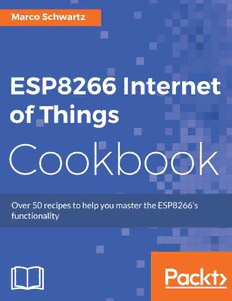
ESP8266 Internet of Things Cookbook: Over 50 recipes to help you master ESP8266 functionality PDF
Preview ESP8266 Internet of Things Cookbook: Over 50 recipes to help you master ESP8266 functionality
ESP8266 Internet of Things Cookbook Over 50 recipes to help you master the ESP8266's functionality Marco Schwartz BIRMINGHAM - MUMBAI ESP8266 Internet of Things Cookbook Copyright © 2017 Packt Publishing All rights reserved. No part of this book may be reproduced, stored in a retrieval system, or transmitted in any form or by any means, without the prior written permission of the publisher, except in the case of brief quotations embedded in critical articles or reviews. Every effort has been made in the preparation of this book to ensure the accuracy of the information presented. However, the information contained in this book is sold without warranty, either express or implied. Neither the author, nor Packt Publishing, and its dealers and distributors will be held liable for any damages caused or alleged to be caused directly or indirectly by this book. Packt Publishing has endeavored to provide trademark information about all of the companies and products mentioned in this book by the appropriate use of capitals. However, Packt Publishing cannot guarantee the accuracy of this information. First published: April 2017 Production reference: 1240417 Published by Packt Publishing Ltd. Livery Place 35 Livery Street Birmingham B3 2PB, UK. ISBN 978-1-78728-810-2 www.packtpub.com Credits Author Project Coordinator Marco Schwartz Kinjal Bari Reviewer Proofreader Catalin Batrinu Safis Editing Acquisition Editor Indexer Prachi Bisht Francy Puthiry Content Development Editor Graphics Trusha Shriyan Kirk D'Penha Technical Editor Production Coordinator Varsha Shivhare Nilesh Mohite Copy Editor Cover Work Safis Editing Nilesh Mohite About the Author Marco Schwartz is an electrical engineer, entrepreneur, and blogger. He has a master's degree in electrical engineering and computer science from Supélec, France, and a master's degree in micro engineering from the Ecole Polytechnique Fédérale de Lausanne (EPFL), Switzerland. He has more than five years of experience working in the domain of electrical engineering. Marco's interests center around electronics, home automation, the Arduino and Raspberry Pi platforms, open source hardware projects, and 3D printing. He has several websites about the Arduino, including the open home automation website, which is dedicated to building home automation systems using open source hardware. Marco has written another book on home automation and the Arduino, called Arduino Home Automation Projects. He has also written a book on how to build Internet of Things projects with the Arduino, called Internet of Things with the Arduino Yun, by Packt Publishing. About the Reviewer Catalin Batrinu graduated from the Politehnica University of Bucharest in Electronics, Telecommunications, and Information Technology. He has worked as a software developer in telecommunications for the past 16 years. He started working with old protocols to the latest network protocols and technologies so he caught all the transformations in telecommunication industry. He has implemented many telecommunication protocols, from access adaptations and backbone switches to high capacity carrier-grade switches on various hardware platforms, such as Wintegra and Broadcom. Internet of Things came as a natural evolution for him, and now he collaborates with different companies to construct the world of the future that will make our life more comfortable and secure. Using ESP8266, he has prototyped devices such as irrigation controller, smart sockets, window shutters, lighting control using Digital Addressable Lighting Control (DALC), and environment control, all of them being controlled directly from a mobile application over the cloud. Even an MQTT broker with a bridging and web socket server has been developed for the ESP8266. Soon, all these devices will be part of our daily life, so we will all enjoy their functionality. You can read his blog at http://myesp8266.blogspot.com. www.PacktPub.com eBooks, discount offers, and more Did you know that Packt offers eBook versions of every book published, with PDF and ePub files available? You can upgrade to the eBook version at www.PacktPub.com and as a print book customer, you are entitled to a discount on the eBook copy. Get in touch with us at [email protected] for more details. At www.PacktPub.com, you can also read a collection of free technical articles, sign up for a range of free newsletters and receive exclusive discounts and offers on Packt books and eBooks. https://www.packtpub.com/mapt Get the most in-demand software skills with Mapt. Mapt gives you full access to all Packt books and video courses, as well as industry-leading tools to help you plan your personal development and advance your career. Why subscribe? f Fully searchable across every book published by Packt f Copy and paste, print, and bookmark content f On demand and accessible via a web browser Customer Feedback Thanks for purchasing this Packt book. At Packt, quality is at the heart of our editorial process. To help us improve, please leave us an honest review on this book's Amazon page at https://www.amazon.com/dp/1787288102. If you'd like to join our team of regular reviewers, you can e-mail us at customerreviews@ packtpub.com. We award our regular reviewers with free eBooks and videos in exchange for their valuable feedback. Help us be relentless in improving our products! Table of Contents Preface v Chapter 1: Configuring the ESP8266 1 Introduction 1 Setting up the Arduino development environment for the ESP8266 2 Choosing an ESP8266 board 4 Required additional components 9 Uploading your first sketch to the ESP8266 15 Connecting the ESP8266 to your local Wi-Fi network 17 Connecting the ESP8266 to a cloud server 20 Troubleshooting basic ESP8266 issues 24 Chapter 2: Your First ESP8266 Projects 27 Introduction 27 Functionalities of the ESP8266 28 Reading digital signals 32 Reading analog signals 35 Controlling an LED 37 Dimming an LED 39 Controlling a servo motor 41 Measuring data from a digital sensor 44 Controlling an OLED screen 48 Troubleshooting basic ESP8266 issues 55 Chapter 3: More ESP8266 Functions 57 Introduction 57 Discovering the advanced functions of the ESP8266 58 Using libraries on the ESP8266 60 Discovering the filesystem of the ESP8266 65 i
